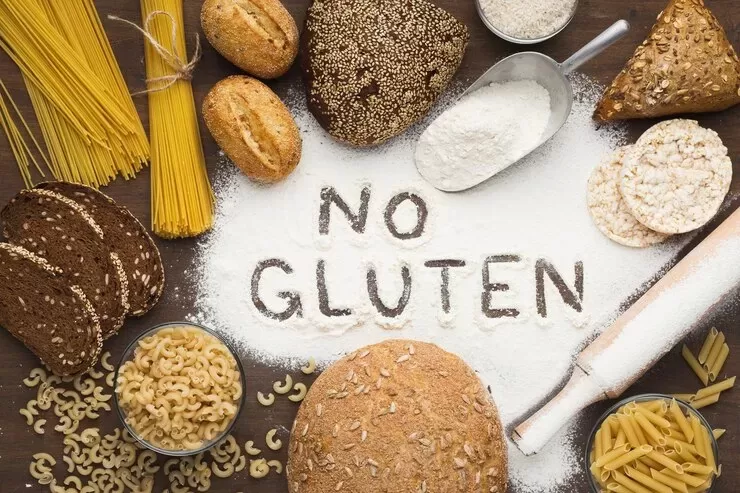Have you heard about the gluten-free craze? What exactly is gluten, and why is it causing such a buzz? Is it truly harmful to your body, or is it just a fad? Let’s explore the potential effects of gluten on your health, from your gut to your skin, and discover if a gluten-free diet is right for you.
Some individuals report experiencing various health issues after consuming gluten, leading to the belief that gluten sensitivity is a widespread condition. However, scientific research has not yet reached a consensus on the prevalence and underlying mechanisms of gluten sensitivity.
This article aims to shed light on the complex relationship between gluten and human health. By understanding the nuances of gluten intolerance and celiac disease, individuals can make informed decisions about their dietary choices.

The Gluten Sensitivity Debate
The concept of gluten sensitivity has gained significant attention in recent years, with many individuals reporting various health problems after consuming gluten-containing foods. While celiac disease is a well-defined autoimmune disorder, gluten sensitivity remains a more elusive condition. This section will delve into the ongoing debate surrounding gluten sensitivity, exploring the evidence for and against its existence.
Gluten sensitivity is often described as a non-celiac gluten intolerance, encompassing individuals who experience adverse symptoms after consuming gluten despite not having celiac disease.
While the exact mechanisms underlying gluten sensitivity are not fully understood, it is believed to involve a heightened immune response to gluten or other components of wheat. Recent studies, such as the 2023 meta-analysis by Dr. Mark Hyman, have suggested that gluten sensitivity may affect a significant portion of the population.
Evidence For Gluten Sensitivity
- Subjective Reports: Numerous individuals report experiencing various symptoms after consuming gluten, including digestive issues, fatigue, headaches, and skin problems.
- Emerging Research: Studies conducted by researchers like Dr. Andrew Wakefield and Dr. Alessio Fasano have shown that some individuals with non-celiac gluten intolerance exhibit immune responses to gluten.
- Genetic Predisposition: Certain genetic factors may increase susceptibility to gluten sensitivity, as suggested by research conducted by Dr. Peter Green.
Potential Symptoms Associated with Gluten Sensitivity
- Digestive Symptoms: Bloating, gas, constipation, diarrhea, certain food intolerance (e.g. vermicelli noodles, sesame oil, paprika, citric acid, garlic)
- Extraintestinal Symptoms: Fatigue, headaches, skin rashes (dermatitis herpetiformis), joint pain, brain fog
- Psychological Symptoms: Anxiety, depression
Disclaimer: It is important to note that the evidence for gluten sensitivity is still evolving, and further research is needed to establish definitive criteria for diagnosis. If you suspect gluten sensitivity, it is advisable to consult with a healthcare professional for proper evaluation and guidance.
Celiac Disease
Celiac disease is a well-established autoimmune disorder characterized by an adverse reaction to gluten, a protein found in wheat, barley, and rye. Unlike gluten sensitivity, celiac disease is a severe condition that can cause significant damage to the small intestine. This section will delve into the symptoms, diagnosis, and management of celiac disease, emphasizing the crucial role of a gluten-free diet.
Celiac Disease and Autoimmunity
Celiac disease is an autoimmune disorder, meaning the body’s immune system mistakenly attacks its own tissues. In individuals with celiac disease, the immune system reacts to gluten by damaging the lining of the small intestine. This damage can lead to malabsorption of nutrients, resulting in various health problems. Recent studies, such as the 2023 research conducted by Dr. Peter Green, have highlighted the genetic predisposition to celiac disease.
Symptoms of Celiac Disease
- Digestive Symptoms: Diarrhea, bloating, gas, constipation, abdominal pain
- Extraintestinal Symptoms: Fatigue, weight loss, anemia, osteoporosis, skin rashes (dermatitis herpetiformis), joint pain, neurological problems, certain drink intolerance (e.g. tomato juice, lime juice, pineapple juice)
- In Children: Delayed growth and development, irritability, behavioral problems
Diagnosis of Celiac Disease
- Blood Tests: Serological markers, such as anti-tissue transglutaminase antibodies (TTG) and anti-endomysium antibodies (EMA), are often used to screen for celiac disease.
- Small Intestine Biopsy: A biopsy of the small intestine is typically required to confirm the diagnosis and assess the extent of intestinal damage.
Importance of a Gluten-Free Diet
A strict gluten-free diet is the only effective treatment for celiac disease. By avoiding gluten-containing foods, individuals with celiac disease can prevent further damage to their small intestine and improve their overall health. Adherence to a gluten-free diet can alleviate symptoms, reduce the risk of complications, and improve quality of life.

High Gluten Foods and Their Substitutes
| High Gluten Food | Gluten-Free Substitute |
| Wheat Bread | Gluten-Free Bread (made from ingredients like rice flour, almond flour, or coconut flour) |
| Pasta | Gluten-Free Pasta (made from ingredients like rice flour, quinoa, or buckwheat) |
| Baked Goods (cakes, cookies, muffins) | Gluten-Free Baked Goods (made with gluten-free flours and binders) |
| Cereals (wheat, barley, rye) | Gluten-Free Cereals (made from ingredients like rice, oats, or quinoa) |
| Crackers | Gluten-Free Crackers (made from ingredients like rice, corn, or almond flour) |
| Beer | Gluten-Free Beer (made from ingredients like sorghum, rice, or corn) |
| Sauces and Gravies (if thickened with wheat flour) | Gluten-Free Sauces and Gravies (thickened with cornstarch or arrowroot) |
Ultimately, the decision of whether gluten is bad for you depends on your individual circumstances. If you have celiac disease, a gluten-free diet is undoubtedly necessary. For those without celiac disease, the benefits and risks of a gluten-free diet may vary.
By understanding the nuances of gluten intolerance and celiac disease, individuals can make informed choices about their dietary habits, including whether to avoid pico de gallo or sour cream and prioritize their overall well-being.
Know more about which foods are gluten-free here!
FAQs
What is unhealthy about gluten?
Gluten, a protein found in wheat, barley, and rye, can be harmful to individuals with celiac disease or non-celiac gluten sensitivity. These conditions cause an immune reaction that damages the small intestine, leading to various health issues.
Should I stop eating gluten?
If you have been diagnosed with celiac disease or non-celiac gluten sensitivity, it is crucial to adopt a gluten-free diet to manage your symptoms and prevent further damage to your digestive system. However, if you do not have these conditions, there is no strong evidence to suggest that a gluten-free diet is necessary for overall health.
Is it healthy to be gluten-free?
A gluten-free diet can be healthy if it is well-planned and includes a variety of nutritious foods. However, it is essential to ensure that you are not missing out on essential nutrients that are naturally found in gluten-containing grains, such as iron, fiber, and B vitamins.
What’s the truth about gluten?
The truth about gluten is that it is generally safe for most people. However, for individuals with celiac disease or non-celiac gluten sensitivity, gluten can cause significant health problems. If you suspect you may have one of these conditions, it is important to consult with a healthcare professional for proper diagnosis and guidance.




